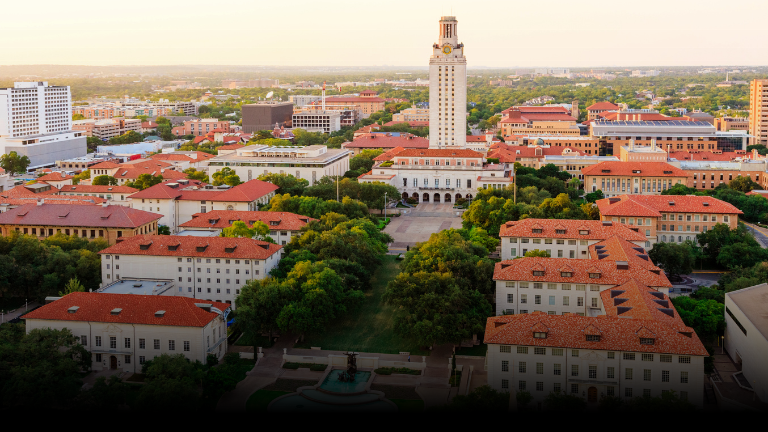For three months, 11 researchers swapped their laboratories in Portugal for those at the University of Texas at Austin. On the other side of the ocean, seasoned researchers from UT were waiting to welcome them and facilitate their adaptation to a new research and innovation ecosystem. In their suitcases, they carried plans to develop their research, collaborations and network, but also expectations of getting to know a new city – for many, a new country – and culture.
Once the adventure was over, we spoke with some of the participants of the Short-Term Research Internships at the University of Texas at Austin – 2024, to take stock of their experience, but also to look forward to new research opportunities now that they are back in Portugal.
Academic Excellence and Interdisciplinary Collaboration
The reputation of UT Austin as a hub for cutting-edge research and interdisciplinary collaboration was a significant draw for all participants. For many, this represented a unique opportunity to engage with leading experts and gain access to world-class facilities. Researchers like Helena Felgueiras (Centre for Textile Science and Technology (2C2T), hosted by Professor Jonathan Y. Chen, emphasized the importance of working within interdisciplinary frameworks, allowing for the cross-pollination of ideas between fields such as medical textiles, biomaterials, and nanotechnology.
These collaborations also facilitated the development of innovative methodologies and the refinement of research techniques, as stated by Mafalda Correia, hosted by Professor Nicholas A. Peppas. The researcher from the Faculty of Pharmacy of the University of Coimbra found out about this opportunity when she was preparing to start her PhD. “I felt that that transition period would be a perfect opportunity to do an international internship”, she recalls.
Expanding Scientific Knowledge and Skills
Participants entered the program with clear academic and research objectives. For Helena Felgueiras, the focus was on advancing her work on fiber-based composites for biomedical applications, particularly through the reuse of tissue scraps. Inês Costa (University of Minho), hosted by Professor Jennifer Maynard, explored the shift from enzyme-based research to antibody-focused studies, broadening her understanding of protein engineering and its applications in diagnostics and therapeutics.
Similarly, Nicolas Guidotti (INESC-ID) — hosted by Professor Per-Gunnar Martinsson — delved into numerical methods in applied mathematics, integrating randomization techniques to enhance computational efficiency.
Each researcher benefited from tailored mentorship and access to specialized resources. This dynamic environment not only deepened their domain-specific expertise but also introduced new perspectives and innovative approaches. For example, Paloma Toscan (University of Minho), hosted by Professor Junfeng Jiao, applied advanced machine learning techniques to analyze urban sustainability issues, while Miguel Morais (Institute for Research and Innovation in Health [i3S]), hosted by Professor Laura J. Suggs, expanded his neurobiology research through access to cutting-edge tools and methodologies.
Practical Applications and Career Development
The internships provided hands-on experience, which participants viewed as instrumental in shaping their career trajectories. Researchers like Magda Correia (Institute of Biomedicine, University of Aveiro), hosted by Nicholas A. Peppas, and Mafalda Correia highlighted the practical components of their projects, such as designing delivery systems for therapeutic applications and working with hydrogels for tissue regeneration. These experiences not only enhanced their technical skills but also contributed directly to the progress of their ongoing research back in Portugal.
Paloma Toscan, for instance, hopes to apply the knowledge gained in Austin to her research work on land use/land cover changes in Guimarães, Portugal. This will lead her to “predict future urban scenarios and provide actionable insights for urban planners”.
Moreover, the exposure to an international academic environment helped participants build valuable professional networks. Many emphasized the long-term benefits of these connections, which extend beyond the duration of the program. Opportunities for future collaborations, feedback from esteemed mentors, and interactions with peers from diverse backgrounds were consistently cited as transformative aspects of the experience.
Cultural and Personal Growth — while Looking Ahead
Beyond academic achievements, the program offered a chance for participants to immerse themselves in a new culture, fostering adaptability and independence. Living in Austin allowed them to experience a vibrant and diverse community, enriching their personal lives while broadening their perspectives. Participants like Inês Costa described this period as invaluable for personal growth, emphasizing the importance of navigating challenges and building resilience in unfamiliar settings.
“I view this opportunity as a personal challenge, one that will help me grow both professionally and individually, by improving my adaptability, resilience, and problem-solving skills”, stated Inês. From Mafalda Correia’s point of view, this experience allowed her “to work on my adaptability and independence and collaborate with people from different backgrounds, which inevitably made me grow as a researcher but also as an individual”.
As the participants return to Portugal, they carry with them not only the outcomes of their research but also the skills, insights, and connections gained during their time at UT Austin. This experience has opened doors to new opportunities, both in academia and beyond, reinforcing the value of international collaboration in driving scientific and professional advancement. The program stands as a testament to the transformative power of such initiatives, fostering innovation and strengthening ties between research communities across borders.

